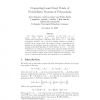47 search results - page 1 / 10 » Computing the Least Fixed Point of Positive Polynomial Syste... |
CORR
2010
Springer
13 years 5 months ago
2010
Springer
We consider equation systems of the form X1 = f1(X1, . . . , Xn), . . . , Xn = fn(X1, . . . , Xn) where f1, . . . , fn are polynomials with positive real coefficients. In vector fo...
STACS
2010
Springer
14 years 8 days ago
2010
Springer
We study systems of equations of the form X1 = f1(X1, . . . , Xn), . . . , Xn = fn(X1, . . . , Xn) where each fi is a poly
DLT
2008
13 years 6 months ago
2008
We show that for several classes of idempotent semirings the least fixed-point of a polynomial system of equations X = f(X) is equal to the least fixed-point of a linear system obt...
CSL
2009
Springer
13 years 9 months ago
2009
Springer
My talk will be a survey of recent results about the quest for a logic capturing polynomial time. In a fundamental study of database query languages, Chandra and Harel [4] first ra...
BIRTHDAY
2010
Springer
13 years 6 months ago
2010
Springer
The question of whether there is a logic that captures polynomial time was formulated by Yuri Gurevich in 1988. It is still wide open and regarded as one of the main open problems...

